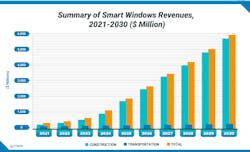Smart windows revenues could reach $2.6 billion by 2026
Industry analyst firm n-tech Research announced that it has this month issued its latest global smart windows market report.
The report notes that the growing global focus on reducing carbon and greenhouse gas emissions and meeting net zero mandates will result in demand for a range of technologies such as electrochromics, solar, sensors and software for building controls.
The analyst projects that government mandates, combined with incentives and development of advanced building materials and technologies, will serve as powerful drivers which will, in turn, grow the smart windows market from around $300 million in 2021 to $2.6 billion in 2026.
n-tech adds that trends in smart cities and smart buildings and developments in materials/coating technology will lead to even further improved cost/performance ratios in smart windows, which may offer additional strength to the sector.
The new report analyzes and forecasts the worldwide smart windows market over the coming decade. The research analyzes specific opportunities for smart windows in office buildings, retail/stores, industrial buildings, multitenant buildings, single family homes, hotels and the hospitality sector, healthcare, airports, educational institutions and greenhouses. It also provides a review of the status of smart windows in cars and aircraft.
The new n-tech report also includes a granular, ten-year forecast for likely revenues and volumes from smart windows shipments. Break-outs of these forecasts are provided for major applications and technologies. The report also discusses the costs trends for the smart windows markets.
As stated by the analyst:
A strong driver for the renewed interest [in the market] is that smart windows are being repositioned as part of the emerging 'smart buildings' meme. This includes enabling integration with older building networking platforms such as Modbus, BACNet or, for more functionality, smart windows [associated with] vendor proprietary networks. Taking this to the next stage, smart windows will become part of edge networks in smart buildings or smart cities through the use of smart windows gateways.
The researcher notes that smart windows stand to become even smarter with the use of more sensors and AI technologies. The new report suggests that sensors will find extensive use for real-time tint functionality. Smart windows are now expected to change on a real-time basis in response to weather conditions and without human intervention, and more importantly without delay, adds n-tech.
"We are seeing the beginnings of the next phase in the evolution of smart windows based on innovations in fabrication and materials technology," commented a representative for n-tech Research. "If these succeed, lower-cost EC glass will be established as an option in a broader range of buildings constructed without extravagant budgets."
Additional details about the n-tech Research smart windows markets report are available at: https://www.ntechresearch.com/market-reports/smart-windows-market-opportunities/.

